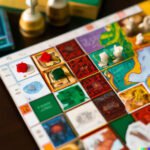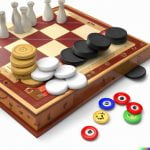Classic board games have been a staple of childhood entertainment for generations. These timeless games not only provide hours of fun and laughter but also offer numerous educational benefits. In this article, we will explore the enduring appeal and importance of classic board games for children, as well as the skills they promote – strategic thinking, problem-solving, and social interaction.
Board games have stood the test of time because they engage children in a way that goes beyond mere entertainment. These games require players to think strategically, plan ahead, make decisions, and adapt to changing circumstances – all valuable life skills. Through playing board games, children learn to analyze situations, weigh options, and understand cause-and-effect relationships.
Another crucial aspect of classic board games is their ability to foster social interaction. Whether playing with siblings, friends, or parents, board games create opportunities for children to develop important social skills such as turn-taking, collaboration, communication, and sportsmanship. They learn how to win gracefully and handle defeat with resilience – valuable lessons that are necessary throughout life.
So whether it’s conquering new territories in a game of Risk or navigating through the Candy Land’s colorful path, classic board games provide more than just fun-filled moments. They nurture critical thinking abilities while nurturing bonds between players. In the following sections of this article, we will delve deeper into specific classic board games that every child should experience as well as explore the various educational benefits they offer.
Top 5 Must-Have Classic Board Games for Children
When it comes to classic board games for children, there are a few timeless favorites that every child should experience. These games not only provide hours of entertainment but also promote important skills such as critical thinking, strategy development, and social interaction. Here are the top 5 must-have classic board games for children that have stood the test of time.
1. Chess: Chess is a game that has been played for centuries and continues to captivate both children and adults alike. It is a game of strategy and planning, where players must think several moves ahead to outwit their opponent. Chess helps children enhance their problem-solving skills, logical thinking, and concentration abilities. With different levels of difficulty, chess can be enjoyed by players of all ages.
2. Monopoly: Monopoly has been a staple in households since its creation in the early 20th century. This classic game teaches children about money management, decision-making, and negotiation skills. As players buy properties and collect rent from their opponents, they learn valuable lessons about budgeting and investing. Monopoly also fosters healthy competition among players and encourages social interaction.
3. Scrabble: Scrabble is not only a fun word-building game but also an excellent way for children to improve their vocabulary and spelling skills. Players must strategically place letter tiles on the board to create words while trying to maximize their points by utilizing high-scoring letters or bonus squares. Scrabble stimulates critical thinking as players strategize how to use their letters effectively while considering words that can be formed from existing ones on the board.
4. Clue: Clue is a thrilling mystery-solving game that challenges children’s deductive reasoning abilities. Players take on the roles of characters investigating a murder in a mansion and must use clues gathered throughout the game to deduce who committed the crime, with what weapon, and in which room. Clue teaches children the importance of logical deduction, attention to detail, and problem-solving.
5. Candy Land: Candy Land is a colorful and enchanting game perfect for younger children. It helps develop their counting skills as they navigate through the candy-filled world, following the colorful path to reach King Kandy’s Castle. Candy Land also introduces the concept of turn-taking and encourages social interaction among players.
These top 5 classic board games for children provide not only entertainment but also valuable educational benefits. Whether it’s improving critical thinking, enhancing vocabulary, or fostering social skills, these timeless favorites are must-haves in any child’s board game collection.
Educational Benefits of Classic Board Games for Children
Classic board games are not only entertaining, but they also offer numerous educational benefits for children. These games provide a unique opportunity for children to learn and develop essential cognitive and social skills while having fun. By engaging in strategic thinking, problem-solving, and social interaction, children can reap the rewards of playing classic board games.
One of the key advantages of classic board games is the enhancement of critical thinking skills. Many of these games require players to analyze different scenarios, make decisions, and anticipate outcomes. For instance, in chess, players must think several moves ahead and consider various strategies to outmaneuver their opponents. This kind of thinking promotes logical reasoning and improves problem-solving abilities.
Furthermore, classic board games foster the development of important social skills. While playing these games, children have the opportunity to interact with others, negotiate rules, take turns, and practice good sportsmanship. They learn how to communicate effectively, resolve conflicts peacefully, and collaborate with teammates in cooperative games. These social interactions help children build relationships, improve their communication skills, and develop empathy towards others.
In addition to critical thinking and social skills development, classic board games can also enhance a child’s mathematical abilities. Many of these games involve counting spaces or points on a board or using simple arithmetic for scoring purposes. Games like Monopoly or Snakes and Ladders allow children to practice basic math concepts such as addition and subtraction in a fun and engaging way.
| Benefit | Description |
|---|---|
| Critical Thinking | Games promote logical reasoning and problem-solving skills. |
| Social Skills | Players learn how to communicate effectively and collaborate with others. |
| Math Skills | Games provide opportunities to practice basic math concepts. |
Classic Board Games for Different Age Groups
When it comes to classic board games for children, it’s important to consider the age appropriateness of each game. Different age groups have varying levels of cognitive abilities, attention spans, and interests. Here, we will highlight some popular board games suitable for specific age ranges, from preschoolers to preteens.
Preschoolers (Ages 3-5)
For the youngest players, simplicity and engagement are key factors in choosing a board game. One beloved classic that fits the bill is Candyland. This colorful game teaches young children about taking turns and following simple instructions. With its vibrant design and easy gameplay, Candyland captures preschoolers’ attention while also developing their counting skills.
Another excellent choice for preschoolers is Chutes and Ladders. Through this game, children learn how to count as they navigate their way up ladders and down chutes. Its straightforward mechanics make it an ideal introduction to turn-taking and basic decision-making for little ones.
Elementary School Age (Ages 6-10)
As children grow older, their ability to handle more complex rules increases. One popular classic that appeals to this age group is Monopoly Junior. This simplified version of the iconic Monopoly game introduces elementary school-aged kids to concepts like money management and strategic thinking. It also encourages social interaction as players buy properties and negotiate with others.
Another great option is Clue Junior, a kid-friendly adaptation of the famous detective game Clue. In this version, players use their deductive reasoning skills to solve the mystery of who ate the cake. The game offers age-appropriate challenges that promote critical thinking and logical reasoning while fostering collaborative play among friends.
Preteens (Ages 11-12+)
For older children on the cusp of adolescence, games that provide more complex strategies and challenges are ideal. One timeless classic that fits this age group is Scrabble. This word-building game not only enhances language skills but also requires strategic thinking to maximize points. Scrabble is a great way to build vocabulary, engage in friendly competition, and promote critical thinking.
Another excellent choice for preteens is Risk. This global domination game introduces players to the concept of world geography while encouraging strong decision-making skills. With its emphasis on strategy and negotiation, Risk provides an engaging gameplay experience that can keep preteens entertained for hours.
By choosing board games that are appropriate for different age groups, parents can ensure that their children have enjoyable and enriching experiences while playing these classics. From building counting skills to fostering critical thinking, there is a board game out there for every child’s development stage.
Nostalgia Factor
Classic board games have a way of evoking nostalgia, transporting us back to the carefree days of our childhood. These timeless games hold a special place in our hearts and have brought joy and laughter to countless families for generations. Revisiting classic board games from our own childhood not only allows us to relive cherished memories but also offers an opportunity to share these beloved experiences with the next generation.
One such game that often sparks nostalgia is Monopoly. This iconic game, first introduced in 1935, has players buying, selling, and trading properties in an attempt to amass wealth and bankrupt opponents. The game’s distinctive tokens, including the top hat, battleship, and Scottie dog, are reminiscent of simpler times. Monopoly teaches children about property ownership, negotiation skills, decision-making, risk management, and basic math concepts.
Another nostalgic favorite is Scrabble. This word-building classic challenges players to create words using letter tiles on a game board. Scrabble not only enhances vocabulary and spelling skills but also encourages strategic thinking as players strategically place their tiles to maximize points. The satisfaction of creating a high-scoring word or outsmarting opponents with a strategic placement is something that will always bring back fond memories.
Finally, no trip down memory lane would be complete without mentioning Clue. As detectives trying to solve a murder mystery, players move around the game board gathering clues and narrowing down the possible suspects, weapons, and locations. Clue teaches deductive reasoning and logical thinking as players gather information through questioning and process of elimination. The suspenseful nature of uncovering whodunit keeps players engaged and entertained for hours.
These classic board games allow us to bridge the generational gap by inviting children into our own childhood experiences. By playing these games together with our kids or introducing them to play with their friends or siblings, we create lasting memories while imparting valuable life skills such as critical thinking, problem-solving abilities, and social interaction.
The nostalgia factor adds an extra layer of enjoyment and connection, making these classic board games a timeless source of fun for both children and adults.
| Classic Board Game | Year Introduced |
|---|---|
| Monopoly | 1935 |
| Scrabble | 1938 |
| Clue | 1949 |
Classic Board Games for Family Game Nights
Family game nights are a cherished tradition for many households. They provide an opportunity for families to come together, bond, and create lasting memories. Classic board games are perfect for family game nights as they are designed to be enjoyed by players of different ages and skill levels. In this section, we will explore some classic board games that are perfect for family game nights.
Monopoly
Monopoly is a timeless classic that has been enjoyed by families for generations. The game is all about buying, selling, and trading properties to build monopolies and bankrupt your opponents. It teaches children important concepts such as money management, negotiation skills, and strategic thinking. With its iconic gameplay and colorful money, Monopoly is sure to keep the whole family engaged for hours.
Scrabble
Scrabble is a word-building game that challenges players to use their vocabulary and spelling skills to form words on a grid-like board. It is a great choice for family game nights as it encourages critical thinking, language development, and friendly competition. Scrabble also allows players of different ages to compete against each other on an equal playing field since the difficulty level can be adjusted based on player experience and age.
Clue
Clue is a thrilling murder mystery game where players take on the roles of detectives trying to solve a murder case. Through deductive reasoning and logic, players must identify the murderer, weapon, and location of the crime before their opponents do. Clue not only promotes analytical thinking but also fosters social interaction as players ask each other questions and try to gather clues discreetly. This classic board game is sure to bring suspense and excitement to any family game night.
Candy Land
Candy Land is a beloved classic among younger children due to its colorful design and simple gameplay. Players travel through a candy-themed board by drawing colorful cards that dictate their movement. This game is perfect for young children as it helps develop color recognition, counting skills, and basic turn-taking etiquette. Candy Land is a fantastic choice for introducing board games to toddlers and preschoolers during family game nights.
Trouble
Trouble is a fast-paced game that combines luck and strategy. Players race their pawns around the board trying to get all of them “home” before their opponents do. The unique Pop-O-Matic dice roller adds an element of surprise and excitement as players never know how many spaces they will move. Trouble teaches children about counting, probability, and decision-making skills while providing thrilling moments of anticipation during gameplay.
Family game nights are an excellent way to spend quality time together while enjoying the benefits of classic board games. Whether it’s the financial strategies of Monopoly, the word challenges of Scrabble, solving mysteries in Clue, exploring Candy Land’s colorful world, or navigating through Trouble’s unpredictability, these classic board games are sure to bring joy and laughter to any family gathering.
Classic Board Games with Educational Themes
Classic board games have long been a staple in children’s playtime, providing hours of entertainment and opportunities for learning. Incorporating educational themes into these games adds another layer of engagement and fosters a love for learning in children. Here are a few classic board games that cleverly combine fun and education:
Scrabble
This word-building game has been a favorite for generations. Players use their letter tiles to create words on the game board, earning points based on the letters used and the placement on bonus squares. Scrabble not only enhances vocabulary skills but also encourages spelling, critical thinking, and strategic planning.
Monopoly
The world-renowned Monopoly game teaches kids about money management, business strategies, and basic math skills. Players navigate the game board as they buy properties, charge rent, and make financial decisions to become the wealthiest player. Along the way, they learn important concepts like budgeting, negotiation, decision-making, and risk assessment.
Ticket to Ride
This award-winning board game combines geography with strategy as players compete to claim train routes between cities across North America (or other continents in different versions). Children not only learn about different cities and landmarks but also develop spatial awareness, planning skills, and critical thinking abilities.
These classic board games with educational themes provide an enjoyable way for children to enhance their knowledge while having fun with family and friends.
In addition to these examples, there are many other educational-themed classic board games available that cater to various age groups and subjects. Games like “Catan Junior” teach children about resource management; “Timeline” challenges them to place historical events in chronological order; “Operation” familiarizes them with human anatomy; and “Blokus” improves spatial reasoning skills.
By incorporating these educational-themed board games into their children’s playtime, parents and educators can foster a love for learning while promoting important skills such as critical thinking, problem-solving, teamwork, and subject-specific knowledge. These games create memorable experiences that facilitate the development of well-rounded individuals while providing plenty of entertainment along the way.
DIY Classic Board Games
Creating homemade board games can be a fun and rewarding activity for children and their families. Not only does it allow for creativity and customization, but it also fosters a sense of ownership and excitement in the game-making process.
DIY classic board games provide an opportunity for children to engage in hands-on learning, problem-solving, and teamwork while enjoying quality time with loved ones. Here are some ideas and instructions for creating your own classic board games at home:
Tic-Tac-Toe
Tic-Tac-Toe is a classic game that can easily be made at home using simple materials. All you need is a piece of paper or cardboard cut into a square grid, and some X’s and O’s to mark the spaces. You can use buttons, bottle caps, or small stones as markers. Encourage your child to come up with creative designs for their game board and markers.
Memory Game
Memory games are great for improving cognitive skills such as concentration and memory retention. To create your own memory game, cut out pairs of identical pictures or patterns from cardstock or construction paper. Make sure the pictures are age-appropriate and engaging for your child. Place the cards face down on a table or on the floor, then take turns flipping them over to find matches.
Snakes and Ladders
Snakes and Ladders is another beloved classic that can be easily recreated at home. Draw a colorful game board with 100 squares on a large piece of paper or cardboard. Use markers to depict snakes that slide down or ladders that climb up to different squares on the board. You can even personalize the game by adding images or obstacles that reflect your child’s interests.
Whether you choose to recreate these classic games or come up with new ones of your own invention, DIY board games offer endless possibilities for fun and learning. They can be played and enjoyed by children of all ages, and the process of creating them together as a family adds an extra layer of joy and bonding. So gather your materials, unleash your creativity, and get ready for hours of homemade fun with DIY classic board games.
Conclusion
Classic board games have stood the test of time for good reason. They not only provide hours of entertainment but also offer numerous educational benefits for children.
Throughout this article, we have explored the enduring appeal and advantages of classic board games, including how they promote strategic thinking, problem-solving, and social interaction. From the top must-have classics to age-appropriate games and those with educational themes, it is clear that these games have something to offer children of all ages and interests.
One of the key benefits of classic board games is their ability to enhance cognitive skills and critical thinking. Whether it’s planning a strategy in Chess or making calculated decisions in Monopoly, children learn to analyze situations, think ahead, and consider various outcomes. These skills are crucial not only for academic success but also for everyday problem-solving in life.
In addition to cognitive development, classic board games also foster social skills and teamwork. Playing these games with family or friends encourages communication, cooperation, and the ability to take turns. Children learn important values such as patience, sportsmanship, and how to interact with others in a respectful manner.
Furthermore, classic board games create lasting memories while providing a break from screens and technology. As parents introduce these timeless favorites from their own childhoods to their kids during family game nights, nostalgia fills the room. The joy of playing together transcends generations and strengthens family bonds.
In conclusion, classic board games continue to play an essential role in childhood development by promoting critical thinking skills, social interaction, and family connections. With their enduring appeal and educational benefits, these timeless favorites prove that sometimes the best form of entertainment is found in a box on your living room shelf.
So why not dust off those game boards and cards? It’s time to introduce your children to the world of classic board games for memorable experiences and valuable life skills.

I love playing all kinds of games – from classics like Monopoly to modern favourites like Ticket to Ride.
I created this blog as a way to share my love of board games with others, and provide information on the latest releases and news in the industry.





